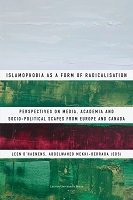Edited by Leen d’Haenens and Abdelwahed Mekki-Berrada
Foundations and mechanisms of Islamophobia in the West. Islamophobia as a Form of Radicalisation discusses the scope and fragmented boundaries of Islamophobia as a concept and a sociopolitical reality. The fifteen chapters of this collection cover and connect interdisciplinary research, media content analysis, media discourse analysis, ethnographic research, intersectoral advocacy work, and action research conducted in Belgium, Canada, France, Germany, Poland, Portugal, and Spain. Confronted with an Islamophobia that is growing as a symptom of broader societal malaise in the West, a resistance against it is also arising. It is now a question of better understanding the foundations and mechanisms of this meta-solidarity and resistance. Islamophobia as a Form of Radicalisation offers recommendations for urgent consideration by Muslim citizens of Canada and Europe, media professionals, civil society and academic stakeholders, policymakers at the municipal, provincial and federal levels
Leuven: Leuven University Press, 2023. 273p.



